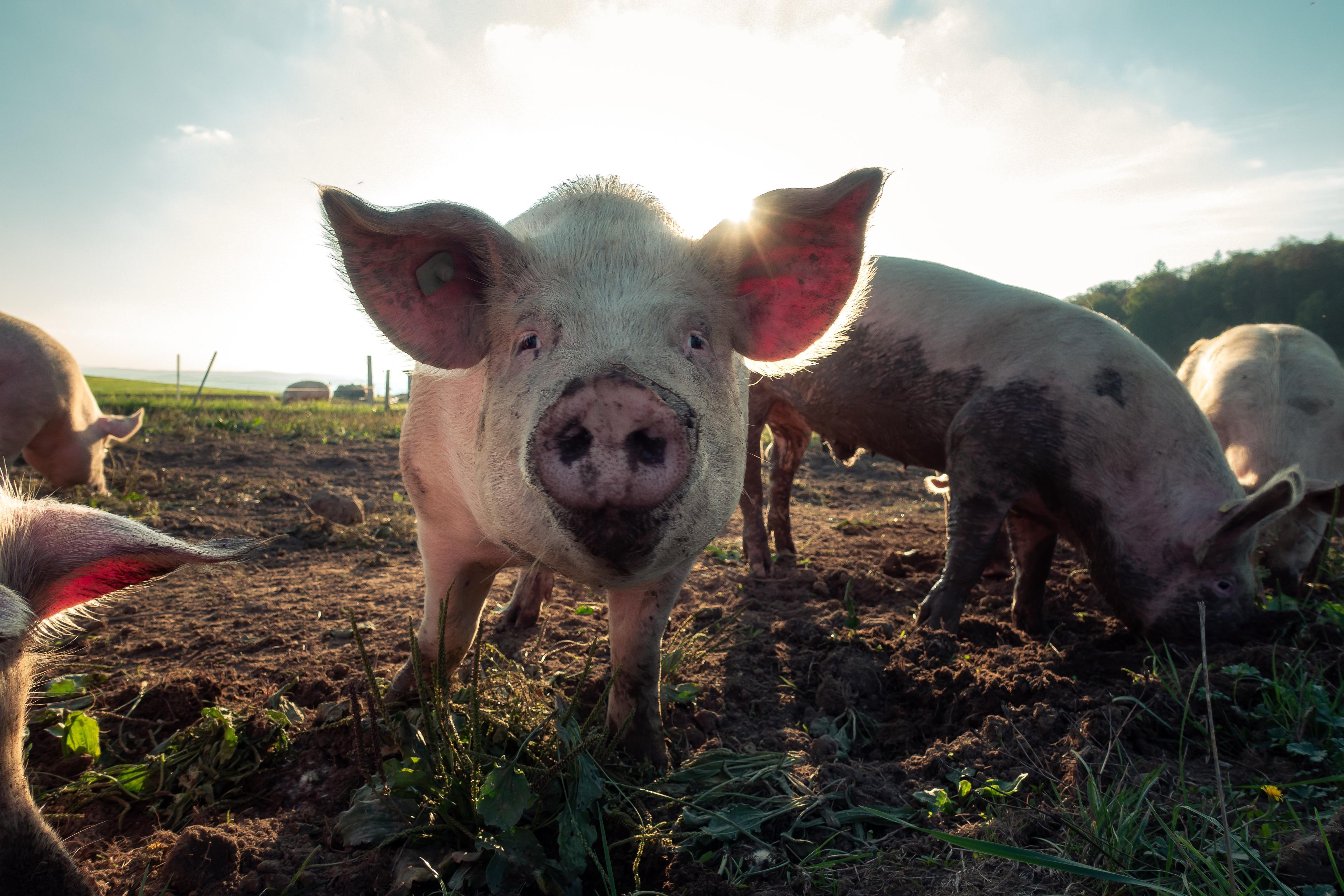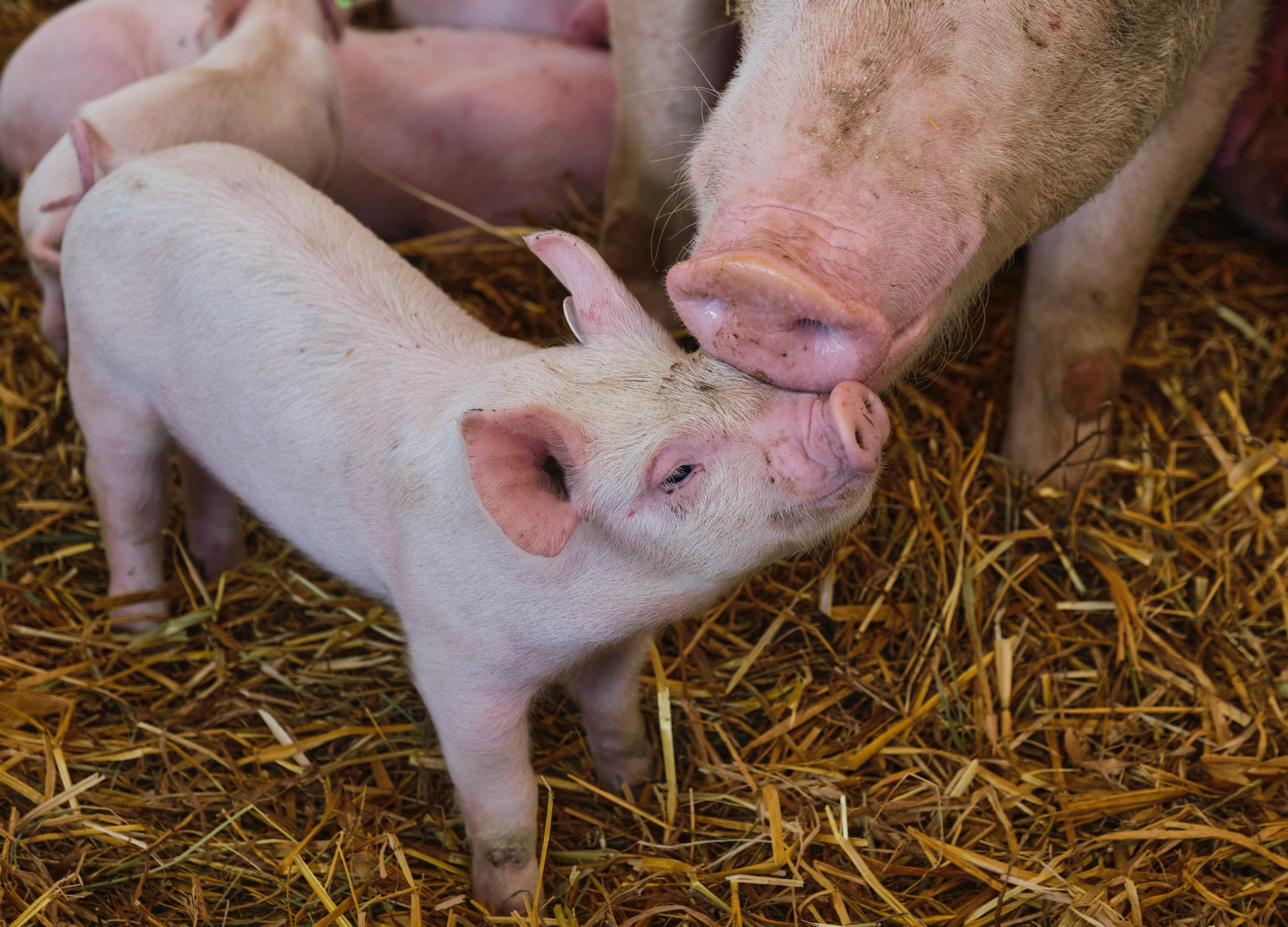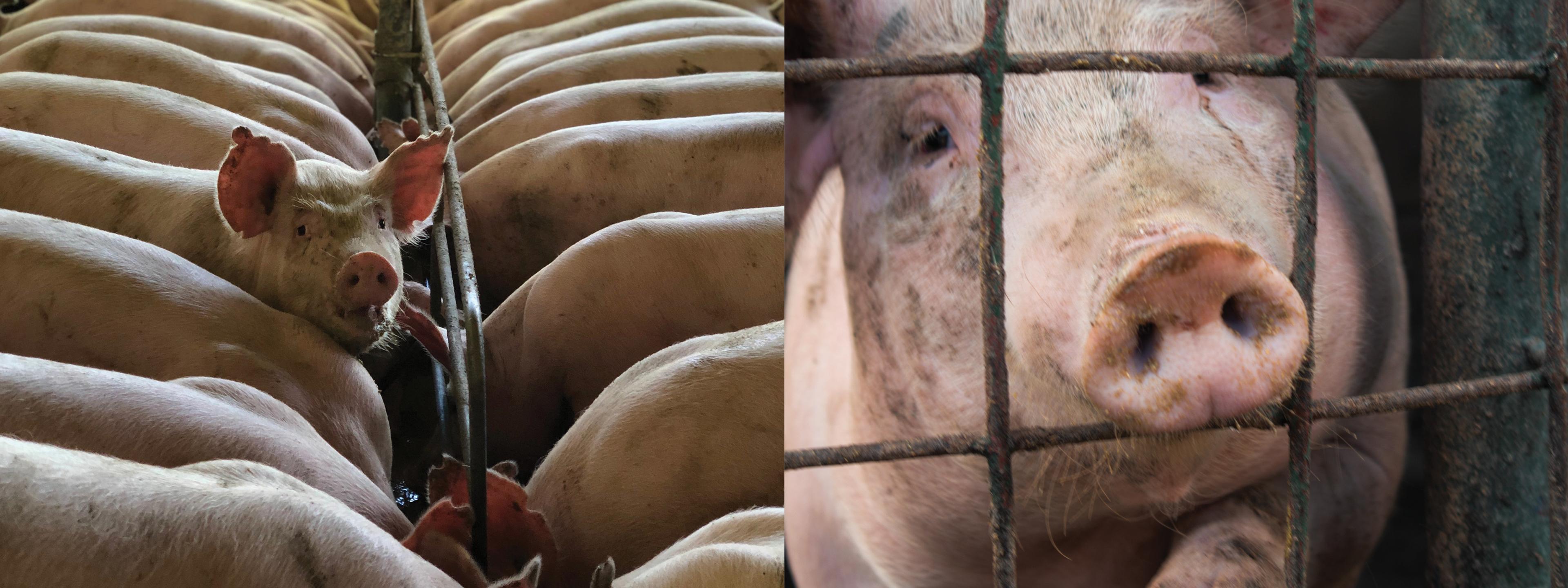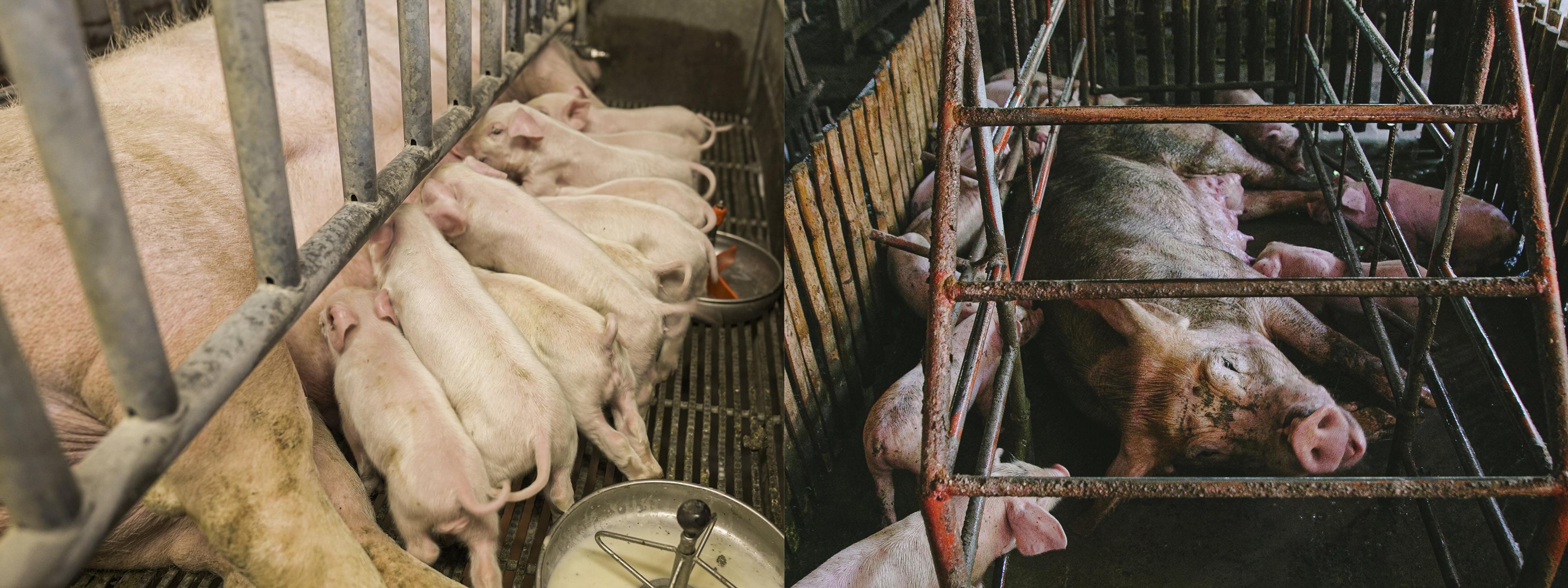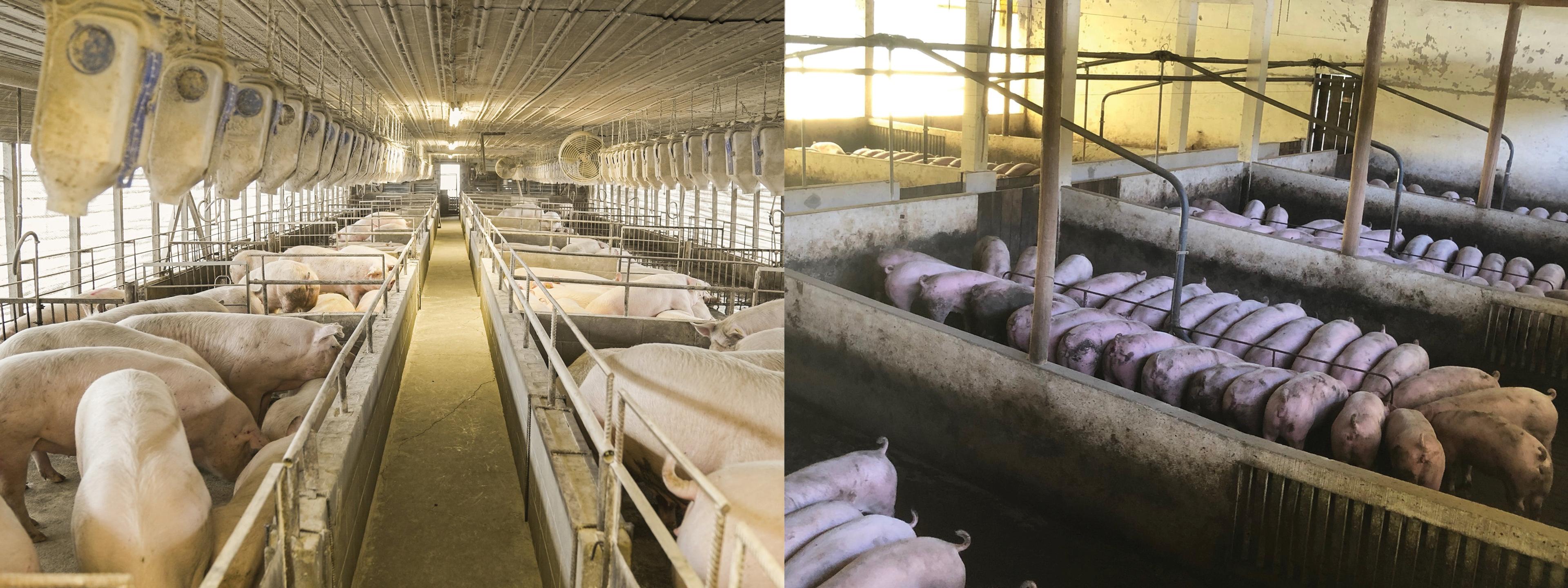Let's Talk Pigs
When did you last see a pig roaming in a paddock when driving through the countryside?
According to Australian Pork Limited, 90% of pork produced in Australia comes from indoor factory farms, where conditions are poor and the pigs don’t even get to go outdoors.
Pigs are intelligent and highly social animals, forming close bonds with their herd mates and operating within complex social hierarchies. They have excellent memories, are great communicators and they like to forage, dig, explore and rest.
Ethical pork only comes from pigs that are raised humanely, free from stress and cruelty, in an environment that supports their natural behaviours.
Given that the majority of Australian pork is factory farmed, sourcing ethical pork products can be challenging. Our top tip is to eat pork sparingly and when you do, go to the effort of sourcing it from genuine free range producers. You’ll pay a higher price but you can be confident that the pigs had a better life.
What is free-range?
When it comes to pork, free-range means the pigs are allowed to roam outdoors in paddocks with access to huts and shelter, from the day they are born until slaughter. There can be no sow stalls or farrowing crates. In other words, free-range pigs are happier pigs.
There is currently no legal definition of free-range for pigs in Australia and each certification body has their own definition. However, in 2015 the ACCC cracked down on misuse of the term, a positive step in making our food system a little more transparent.
If the pork you’re buying is labelled free range, but not certified, we encourage you to seek out more information and where possible, ask questions. Only 5% of Australian pork is truly free range.
Where to buy pork - a hierarchy
We suggest you seek out pork products in this order according to what is available to you.
- Direct from the free-range or organic farmer - lookout for free-range or organic pork at your local farmers’ market or a nearby farm-gate. You will be able to ask as many questions as you like and even visit the farm if you ask really nicely.
- From a free-range/organic butcher - these folks know their meat and will be able to help you purchase the most ethical option.
- From a supermarket or retailer - it can sometimes be hard to find free-range options at large retailers, so use our labelling guide below. Remember, if you don’t know where it came from, eat veg instead!
Breaking down the labels
Food labels can be a minefield, with marketing lingo taking priority over the truth. Here, we summarise labelling pork in Australia.
Australian Pork: APIQ Conventional Indoor Piggery
This pink label advertising Australian pork does not mean it is free range, it is simply an indication that the pig was raised in Australia. If there is no other detail then it has most likely been raised indoors in an intensive piggery. Remember, 90% of Australian pork still comes from factory farms.
APIQ Certified Free Range
The Australian Pork Industry Quality Assurance Program (APIQ) has a certification program. When a producer has gone through this process they will have the following logo visible on their product. This assures you that the pigs were raised outdoors according to Free Range Standards. All pigs raised under Free Range conditions must comply with the Model Code of Practice for the Welfare of Animals – Pigs (3rd Edition, 2010).
Producers are required to provide at least 1.5 times more outdoor space than indoor space for raising pigs. Pigs must be able to move freely in and out of the shelter and around the paddocks.
This process is quite involved and sometimes only makes sense for middle-large sized producers, so if you are buying from a small producer be sure to ask questions if no certification logos are present. Sow stalls and farrowing crates are prohibited.
See the definition for APIQ Certified Free Range.
APIQ Certified Outdoor Bred, Raised Indoors on Straw
This certification was formerly called Bred Free-Range. The ACCC believed this terminology misled consumers into thinking that the pork was free-range and demanded that they change the name to more accurately reflect the product on sale.
Certified outdoor bred, raised indoors on straw means that sows (mother pigs) are kept outdoors for their entire life as per Free Range Standards. Piglets are born and raised under Free Range Standards until weaned (3-4 weeks), they are then moved to large open-sided sheds where they live out their days (they do not go outdoors again).
Sow stalls and farrowing crates are prohibited.
Although this style of farming is a vast improvement on traditional factory farming or intensive systems, it is not considered free range.
See the definition for APIQ Outdoor Bred, Raised Indoors on Straw.
Certified Organic or Biodynamic
Organic and biodynamic farms are managed holistically, focussing on ecosystem health and animal health and welfare.
All certified organic and bio-dynamic meat producers are also free range, due to the strict nature of organic certification. All their feed is organic and so is the farming system, which means no GM grains are used nor any synthetic fertilisers, pesticides or antibiotics.
The only catch may be if they claim to be organic but with no certification logo. This sometimes indicates that ‘organic’ is referring to the feed given to the animals, not the farming system. This will become apparent when closely reading the label.
Sow stalls and farrowing crates are prohibited.
To be certified, food from these systems must be produced according to the Australian Government’s National Standard for Organic and Bio-Dynamic Produce.
Humane Choice: True Free Range
To be certified, pigs must have free access to the outdoors with minimum space requirements in place. Surgical treatments that unnecessarily inflict pain are not permitted, such as tail docking, teeth clipping and nose ringing.
Sow stalls and farrowing crates are prohibited.
See the Humane Choice: True Free Range overview of standards.
Pastured Proof
Pastured Proof certification indicates that pigs are born and raised outdoors with continuous and access to pasture throughout their lifetime.
They are kept at a stocking density that will ensure forage is always available in a sustainably managed rotational grazing system.
Surgical treatments that unnecessarily inflict pain are not permitted, such as tail docking, teeth clipping and nose ringing.
Sow stalls and farrowing crates are prohibited.
See the Pastured Proof Standard for Pigs (2017).
RSPCA Approved
RSPCA Standards do not require pigs to have access to an outdoor or range area, which means that the RSPCA seal alone does not guarantee the pigs are free range.
The RSPCA Approved Farming Scheme also covers both indoor systems and indoor/outdoor combination systems in which breeding pigs have access to a range or outdoor area and growing pigs are kept in indoor systems.
The RSPCA stipulates a minimum space requirement for each pig and all pigs raised indoors must have access to wallows. Sow stalls and farrowing crates are prohibited, with all pigs housed indoors raised in group housing pens.
Surgical treatments that unnecessarily inflict pain are not permitted, such as tail docking, teeth clipping and nose ringing.
Although a vast improvement on current intensive systems, this certification does not live up to the assumed welfare standards attributed to the RSPCA brand.
See the RSPCA Approved Farming Scheme Standard for Pigs.
APIQ Sow or Gestation Stall Free
The Australian pork industry stipulates that in a sow stall free system, breeding pigs are kept in sow stalls for a lesser period of time, after which they are kept in group housing where they have freedom of movement, with minimum space requirements in place.
A further improvement states that a sow must not be kept in stalls for more than six weeks of any one gestation except under exceptional circumstances (previously it could be for her entire pregnancy at around 115 days).
We believe the term Sow Stall Free can mislead consumers, giving the impression that pigs are free to roam when in fact they are still housed indoors for their entire lives and experience only marginally better living conditions.
See the APIQ Gestation Stall Free definition (2010).
APIQ Customer Specifications Coles
Coles’ own brand Sow Stall Free pork products have a slightly higher animal welfare code than the broad definition of Sow Stall Free.
Standards under this verification include slightly larger sow stalls, piglet weaning no earlier than 18 days from birth, and growth promotants are prohibited.
See the APIQ Gestation Customer Specifications Coles definition.
No label
Small producers
Many small producers cannot afford the cost and time of formal certification, however, they are generally all-too-willing to chat to you about their farming practices. Most farmers’ markets have strict requirements around the types of producers they allow. Also, many small producers choose to raise rare-breed pigs, so when you see this listed it is often indicative of a free range farming system (although never a guarantee). The closer to the source you buy your food, the more you will know and the more questions you can ask.
Everyone else
If there is no mention of free range, then you can be almost certain it has come from a factory farmed environment.
There is also a lot of imported pork in Australia, where such standards may not apply or vary greatly from country to country, so it’s worth doing some research online.
Pigs in the News
The 7:30 Report on ABC released footage showing the reality of carbon dioxide stunning for pigs. In Australia, 85% of pigs are stunned for slaughter using this method. The footage captured the pigs entering a “gondola” and then being lowered into the carbon dioxide gas. The pigs squeal and thrash violently, some froth at the mouth, before succumbing to the gas.
The Australian Food Sovereignty Alliance released a statement in response to the report. They outlined that it, "..was a much-needed wake-up call about the need to de-industrialise our food system," and called for, "...state and local governments to support a revival of small-scale local abattoirs owned and controlled by local communities such as the Murray Plains Meat Cooperative and others emerging around Australia."
Australian Pork Limited stated, "The entire Australian pork industry takes the welfare of our animals through their whole life very seriously and we are seeking to receive and review the full footage."
Factory Farmed Pigs: Terms to Understand
Sow Stalls
A sow stall is a small confinement that houses female breeding pigs.They typically restrict movement to one step forwards and backwards. The sow is housed in a stall for some or all of her pregnancy, which lasts for around 115 days. Once the sow has had her litter she is often moved to an even smaller farrowing crate for around six weeks before the piglets are weaned and she is impregnated again.
Though voluntary phasing out of sow stalls began in the pork industry in 2017 (gradually being replaced by group or loose housing), there is evidence that they remain in use on some farms.
Farrowing Crates
Sow confined to a farrowing crate.
According to Australian Pork Limited, a farrowing crate is an enclosure in which a sow farrows (gives birth) and then remains with her litter, typically for around four weeks.
A farrowing crate is designed to protect piglets from being crushed by their mother, which can be a common occurrence in all types of pig farming, but especially so in intensive pig farming.
There is often consumer confusion about the difference between a farrowing crate and a sow stall, which may lead many to believe they are one and the same.
Farrowing crates are actually smaller than sow stalls, restricting the sow from interacting with her young in the name of increasing piglet survival for overall profit.
Once a mother sow has been weaned from her young after 4-6 weeks she will be removed from the farrowing crate, re-impregnated and returned to a sow stall or loose housing for the cycle to start again.
Group or Loose Housing
Group or loose housing is a broad term which encompasses a range of alternatives to sow stalls. Any loose housing must provide a sow with freedom of movement–she must be able to turn around and extend her limbs.
Most loose housing systems involve keeping sows in groups, although individual pens are permitted, as long as they allow freedom of movement.
Numbers can range dramatically across farms. The Model Code of Practice for the Welfare of Animals - Pigs requires that farms allow a minimum of 1.4 square metres per sow.
If you enjoyed reading this article and want to support the work that we are doing, donate today.
